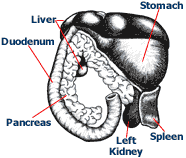Pancreatitis
By Dr’s. Moore, Romberg, MacWilliam & Associates
The pancreas is the organ in the abdomen that is responsible for producing enzymes that aid in digestion of food, as well as producing the hormone insulin which controls blood glucose levels.

Pancreatitis is the inflammation of the pancreas which occurs when the enzymes produced and stored within the pancreas become active and start to digest the pancreas itself.
The aetiology (cause) of pancreatitis is often unknown but various factors may play a role. These include obesity, high fat diets, and exposure to certain drugs. Infectious diseases such as bacterial, viral, mycoplasmal and parasitic infections including babesiosis have been associated with pancreatitis. Although all dogs and cats may be affected, middle-aged to older dogs develop pancreatitis more commonly. Miniature schnauzers are predisposed to pancreatitis due to a tendency to have high levels of fats in their blood.
Dogs with pancreatitis may be depressed, lose their appetite, vomit and have diarrhea. They may also exhibit abnormal pain which may manifest as restlessness, panting, unwillingness to lie down and show discomfort on abdominal palpation. Cats may have more vague clinical signs which may include poor appetite, fever and elevated heart rate.
Pancreatitis may be classified into acute and chronic types. Acute signs are usually more severe and may be fatal as a result of secondary blood clotting abnormalities and chock. Chronic pancreatitis, which is more common cats, may have more subtle signs and may be associated with feline infectious peritonitis or toxoplasmosis.
The veterinarian may suspect pancreatitis based on history and clinical signs. However, blood tests and ultrasonography are required to confirm the diagnosis. Elevation of the pancreatic enzymes (lipase and amylase) assists in confirming the diagnosis. Some animals with pancreatitis may have normal enzyme levels. Serum pancreatic lipase immunoreactivity (cPLi) is the most accurate serum chemistry test used to diagnose pancreatitis but is not yet available in South Africa.
Treatment of pancreatitis involves intravenous fluid therapy, especially in patients which are dehydrated and vomiting. Once vomiting is controlled with anti-emetics and antacids, small amounts of a low fat carbohydrate diet is introduced. Antibiotics and medication to relieve abdominal discomfort are also important in the treatment of this condition.
The aetiology (cause) of pancreatitis is often unknown but various factors may play a role. These include obesity, high fat diets, and exposure to certain drugs. Infectious diseases such as bacterial, viral, mycoplasmal and parasitic infections including babesiosis have been associated with pancreatitis. Although all dogs and cats may be affected, middle-aged to older dogs develop pancreatitis more commonly. Miniature schnauzers are predisposed to pancreatitis due to a tendency to have high levels of fats in their blood.
Dogs with pancreatitis may be depressed, lose their appetite, vomit and have diarrhea. They may also exhibit abnormal pain which may manifest as restlessness, panting, unwillingness to lie down and show discomfort on abdominal palpation. Cats may have more vague clinical signs which may include poor appetite, fever and elevated heart rate.
Pancreatitis may be classified into acute and chronic types. Acute signs are usually more severe and may be fatal as a result of secondary blood clotting abnormalities and chock. Chronic pancreatitis, which is more common cats, may have more subtle signs and may be associated with feline infectious peritonitis or toxoplasmosis.
The veterinarian may suspect pancreatitis based on history and clinical signs. However, blood tests and ultrasonography are required to confirm the diagnosis. Elevation of the pancreatic enzymes (lipase and amylase) assists in confirming the diagnosis. Some animals with pancreatitis may have normal enzyme levels. Serum pancreatic lipase immunoreactivity (cPLi) is the most accurate serum chemistry test used to diagnose pancreatitis but is not yet available in South Africa.
Treatment of pancreatitis involves intravenous fluid therapy, especially in patients which are dehydrated and vomiting. Once vomiting is controlled with anti-emetics and antacids, small amounts of a low fat carbohydrate diet is introduced. Antibiotics and medication to relieve abdominal discomfort are also important in the treatment of this condition.
This article is copyrighted and remains the property of the author. Individuals are welcome to print or copy same for their own use in furthering their knowledge of dogs. However, no reproductions or alterations/variations are allowed without the express written consent of the author.
